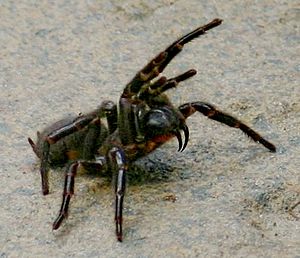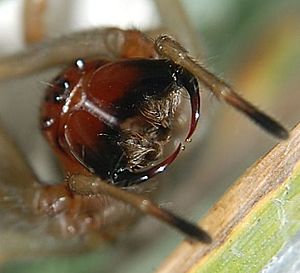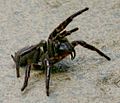Araneomorphae facts for kids
The Araneomorphae are a big group of spiders. You probably see them often in your home or garden! They are different from another group called Mygalomorphae, which includes large spiders like tarantulas. There's also a very old, small group of spiders called Mesothelae.
Contents
How to tell them apart
One main way to tell Araneomorphae spiders apart from Mygalomorphae spiders is by looking at their fangs.
Mygalomorphae fangs

Mygalomorphae spiders, like the Sydney funnel-web spider, have fangs that point straight down. They move their fangs up and down, just like you would chop with an axe. This means they can only bite by striking downwards.
Araneomorphae fangs
Araneomorphae spiders have fangs that point towards each other. They can move their fangs in a pinching motion, like pincers. This allows them to bite in many different ways.
Lifespan differences
Another big difference is how long they live. Mygalomorphae spiders, like tarantulas, can live for a very long time, sometimes up to 25 years! But most Araneomorphae spiders only live for about one year.
What spiders are in this group?
Most of the spiders you see today belong to the Araneomorphae group. The spiders that are not in this group are the Mygalomorphae, which include tarantulas and trapdoor spiders. There's also the small, ancient group called Mesothelae.
The Araneomorphae group includes many well-known spiders, such as:
- Orb-weaver spiders
- Cobweb spiders (like the ones that make messy webs)
- Crab spiders
- Jumping spiders
- Wolf spiders
- Large Huntsman spiders
Images for kids
-
This Atrax robustus shows the orientation of Mygalomorphae fangs.
See also
 In Spanish: Araneomorphae para niños
In Spanish: Araneomorphae para niños
 | Roy Wilkins |
 | John Lewis |
 | Linda Carol Brown |




